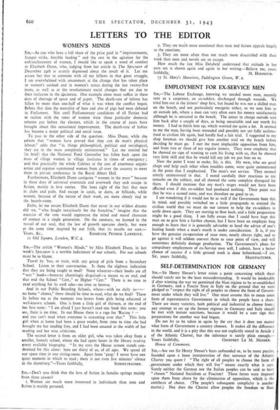EMPLOYMENT FOR EX-SERVICE MEN
Stn,—The Labour Exchange, knowing we needed more men, recently sent us a carpenter, an ex-soldier, discharged through wounds. We tried him out in the joiners' shop first, but found he was not a skilled man on the bench, and not particularly energetic either, so we sent him to an outside job, where a man can very often earn his money satisfactorily although he is unsuited to the bench. The joiner in charge outside sent him back after a couple of days, as being unsuitable and not worth his money. I had to finish him up, which worried me quite a lot. It seemed to me the man, having been wounded and possibly not yet fully acclima- tised to civilian life again, had hardly had a fair trial. I suggested to my shop foreman we should give him another trial on the bench before deciding he must go. I met the most implacable opposition from him, and from two or three of my regular joiners. They were emphatic that he showed no sign of wanting to earn his living with us, that he showed very little skill and that he would kill any job we put him on to.
Now the point I want to make, Sir, is this. My men, who are good chaps and help each other when troubles come, were quite uninterested in the point that I emphasised. The man's war service. They seemed utterly uninterested in that. I noted carefully their reactions to my remarks on the subject, and all showed the same complete disregard for them. I should mention that my men's wages would not have been affected even if this ex-soldier had produced nothing. Their point was that he was a second rater, and was therefore no good to us.
I am wondering if it would not be as well if the Government bore this in mind, and possibly switched on a little propaganda to remind the civilian world that we must do our utmost to help the ex-soldiers to settle down again. They are starting to flow back, and a little preparation might be a good thing. I am fully aware that I could have kept this man on to give him a further chance, but I have been an employer long enough to learn that it is generally advisable to heed the advice of one's leading hands when a man's worth is under consideration. It is, if you have the genuine co-operation of your men, nearly always right, and to go against it will seldom convert them to your point of view, and will sometimes definitely damage production. The Government's plans for compulsory employment of ex-Service men will, I submit, have a better chance of success if a little ground work is done beforehand.—I am,






























 Previous page
Previous page